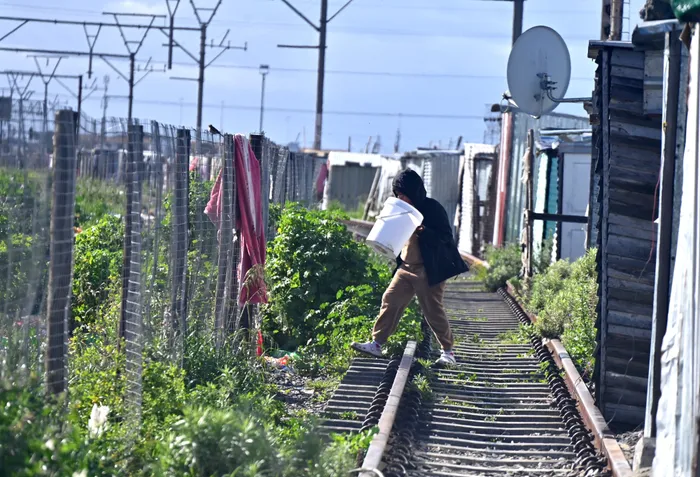
Siyahlala informal settlement shack dwellers living along the Passenger Rail Agency of SA (Prasa) central railway line.
Image: FILE/ Ayanda Ndamane/African News Agency (ANA)
BENEFICIARIES of a multi-million project near Table View are now set to be accommodated in a temporary settlement while government departments continue pointing fingers at each other.
The development of the land bought about seven years ago for “urgent” relocation appears to have stalled as no sphere of government wants to take responsibility.
Both the DA-led provincial government and the City of Cape Town continue to distance themselves over who should build houses on the land.
The blame game takes place as the Special Investigation Unit (SIU) is assessing the purchase of the pocket of Table View land for R64 million by the Western Cape Department of Human Settlements and the Housing Development Agency within Proclamation 265 of 2025 into allegations of serious maladministration of several land deals across the country.
The matter has been ongoing since 2018 when the provincial government bought the land under the pretext of the “urgent” relocation of the Siyahlala informal settlement, which had spilled onto the rail reserve in Dunoon.
Former mayco member GOOD MPL, Brett Herron had raised concerns that the land was allegedly bought at an inflated price and that at least seven hectares are undevelopable for housing as it forms part of a wetland.
Approached for comment on the status of the project, the City referred questions to the provincial government which in turn referred questions back to the City.
On why houses had not yet been built, Mel Botes, spokesperson for provincial human settlements MEC Tertuis Simmers said: “Due to the National Department of Human Settlements’ centralisation of the Emergency Housing Fund, only local authorities can apply for such funds and implement such projects. The Western Cape Department of Infrastructure (DOI) is, therefore, not in a position to respond on behalf of the City of Cape Town. The relocation of the Siyahlala community is the responsibility of the City in terms of a court mandated mediation process.”
National human settlement department spokesperson, Tsekiso Machike said a temporary staging area has been developed next to the railway corridor to provide those affected with Temporary Residential Units. It’s not clear who is footing the bill for this temporary relocation and for how long the beneficiaries will be housed there.
In an August parliamentary reply on the land and proposed project, Simmers said residents from the Siyahlala community were yet to be relocated and the Department was engaging with the City which is “responsible for this relocation process, on how the Killarney Gardens Phase 1 development can be utilised to assist with this process”.
In September, the portfolio committee also conducted a site visit, after which they raised concern over the delay of the Killarney Gardens project “due to bureaucratic processes that could have been sorted out long ago while the people of Dunoon and its surrounding areas continue to endure horrible living conditions”.
The reduction of the number of houses that were initially projected from 1 500 to some 480 houses, without a satisfactory explanation was another concern that the committee raised
The stipulated budget for the planning, design and site preparation phase, including installation of bulk services, for this project is R39 212 341, of which R23 841 547 (61%) had been spent. However, the project had been dormant since 2023.
It has also emerged that the SIU is investigating 16 other land transactions in the Western Cape.
Briefing the portfolio committee on Friday, the SIU explained the modus operandi alleged is that provincial human settlements departments transfer funds to the HDA to buy specific land.
The HDA negotiates with the landowner and obtains three valuations: one from the landowner and two additional valuations it sources. These valuations are supposed to test the fairness of the landowner’s price.
However, it is alleged that two additional deliberately highly inflated valuations are obtained, under the influence of departmental officials to drive up the final purchase price.
The negotiated price typically aligns with the inflated valuation. A middleman is then allegedly inserted into the transaction and the sale agreement is drafted to include an often excessive commission for the middleman, sometimes calculated as a percentage of two to three times the purchase price.
Cape Times